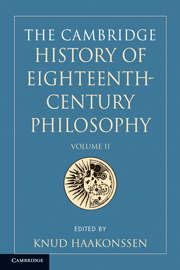Book contents
- Frontmatter
- III Philosophy and Theology
- 21 Natural and Revealed Religion
- 22 Revealed Religion: the Continental European Debate
- 23 Revealed Religion: The British Debate
- 24 Arguments for the Existence of God: The British Debate
- 25 Arguments for the Existence of God: The Continental European Debate
- 26 The Problem of Theodicy
- 27 Religion and Society
- IV Natural Philosophy
- V Moral Philosophy
- Biobibliographical Appendix
- Bibliography
- Index nominum
- Index rerum
- References
27 - Religion and Society
from III - Philosophy and Theology
Published online by Cambridge University Press: 28 March 2008
- Frontmatter
- III Philosophy and Theology
- 21 Natural and Revealed Religion
- 22 Revealed Religion: the Continental European Debate
- 23 Revealed Religion: The British Debate
- 24 Arguments for the Existence of God: The British Debate
- 25 Arguments for the Existence of God: The Continental European Debate
- 26 The Problem of Theodicy
- 27 Religion and Society
- IV Natural Philosophy
- V Moral Philosophy
- Biobibliographical Appendix
- Bibliography
- Index nominum
- Index rerum
- References
Summary
After the French Revolution, optimistic radical reformers expected a new society to emerge, one in which the conflicts between different religious denominations, which provoked the intolerant policy of the Old Regime, would be overcome. Most philosophers demanding the separation of religion and society identified the moral beliefs on which the new society would be built with the rational core of true Christianity, pessimistic conservatives, however, suggested that the Revolution was the result of the decidedly anti-Christian tendencies of the Enlightenment. These conflicting notions of the relationship between the Enlightenment and the Christian religion represent two tendencies of eighteenth-century philosophy, which among other things directed attempts to re-define the role of religion in society. On the one hand, most philosophers were convinced that the order of human society was based on a belief in God as provider of moral law and thus they tried to harmonise the tensions between the other-worldly oriented Christian religion and secular society. On the other hand, philosophers attacked the Christian religion, since they perceived institutionalised Christianity as a form of intolerant superstition or fanaticism. Two wholly different ways of harmonising the tensions between religion and society are depicted in Sections 1 and 4. The first can generally be characterised by the tendency to separate religious issues from social or political ones. Eighteenth-century concepts of toleration proceeded on the assumption that the care of religion did not belong among the duties of the state because religious faith was the purely personal concern of the individual. Among the main arguments used to reject the pretensions of church and state to control religious belief was the assertion of a right to private judgment in religious matters.
- Type
- Chapter
- Information
- The Cambridge History of Eighteenth-Century Philosophy , pp. 779 - 814Publisher: Cambridge University PressPrint publication year: 2000
References
- 2
- Cited by

